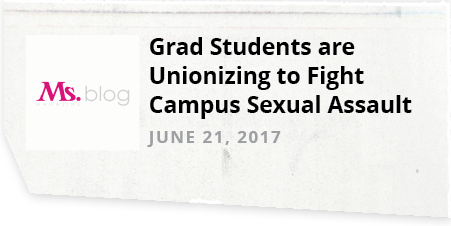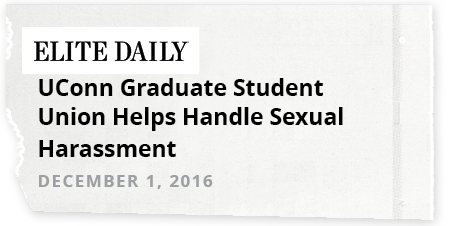
Unions = Real Recourse
Learn about how academic workers unions have provided real recourse against sexual harassment in academia at UConn and the University of California.
“With a union there’s a way to resolve this issue without worry about whether administrators will be fair to you. You are guaranteed representation at every meeting, every step of the way, which is especially important in tragic cases like sexual harassment and sexual assault. You cannot defeat the system on your own.”
“It really did flip the narrative for me about how this goes. This was just different. We were able to protect her because we had the institutional strength, and we had the right to.”
Article 15 – Nondiscrimination
B. SEXUAL HARASSMENT
- The University of California is committed to creating and maintaining a community dedicated to the advancement, application and transmission of knowledge and creative endeavors through academic excellence, where all individuals who participate in University programs and activities can work and learn together in an atmosphere free of harassment, exploitation, or intimidation. The University prohibits sexual harassment and retaliation that violates law, this Article, and/or University policy (herein referred to as prohibited behavior). The University shall respond promptly and effectively to reports of prohibited behavior and shall take appropriate action to prevent, to correct, and when necessary, to discipline behavior that violates the law, this Article, and SVSH Policy.
- Sexual Harassment is defined as unwelcome sexual advances, unwelcome requests for sexual favors, and other unwelcome verbal, nonverbal or physical contact of a sexual nature when:
- Quid Pro Quo: A person’s submission to or rejection of such conduct is implicitly or explicitly made the basis for employment decisions, academic evaluation, or advancement, or other decisions affecting participation in a University program; or
- Hostile Environment: such conduct is sufficiently severe or pervasive that it unreasonably denies, adversely limits, or interferes with a person’s participation in or benefit from the education, employment or other programs and services of the University and creates an environment that a reasonable person would find to be intimidating or offensive.
- Sexual harassment may include incidents between any members of the University community, including: administrators, faculty and other academic appointees (including postdoctoral scholars), staff, student employees, students, coaches, residents, interns, and non-student or non-employee participants in University programs (e.g., vendors, contractors, visitors, and patients); in hierarchical relationships and between peers, and; between individuals of any gender or gender identity.
- The University prohibits retaliation against or by Postdoctoral Scholars based on their report of prohibited behavior or participation in the investigation, report, remedial, or disciplinary processes provided for in the SVSH Policy. Retaliation includes threats, intimidation, reprisals, and/or adverse employment and/or academic actions against a person based on their report of prohibited behavior or participation in the investigation, report, remedial, or disciplinary processes provided for in the SVSH Policy or this Article.
- The Title IX Offices responsible for investigations are listed at: http://sexualviolence.universityofcalifornia.edu/filing-report/index.html.
<!-- Google Tag Manager --><!-- [et_pb_line_break_holder] --><script>(function(w,d,s,l,i){w[l]=w[l]||[];w[l].push({'gtm.start':<!-- [et_pb_line_break_holder] -->new Date().getTime(),event:'gtm.js'});var f=d.getElementsByTagName(s)[0],<!-- [et_pb_line_break_holder] -->j=d.createElement(s),dl=l!='dataLayer'?'&l='+l:'';j.async=true;j.src=<!-- [et_pb_line_break_holder] -->'https://www.googletagmanager.com/gtm.js?id='+i+dl;f.parentNode.insertBefore(j,f);<!-- [et_pb_line_break_holder] -->})(window,document,'script','dataLayer','GTM-WN38BGL');</script><!-- [et_pb_line_break_holder] -->



